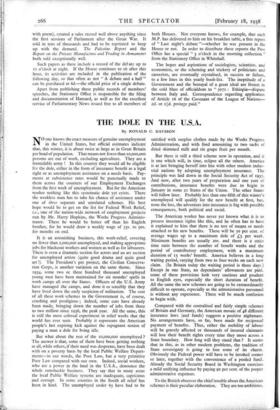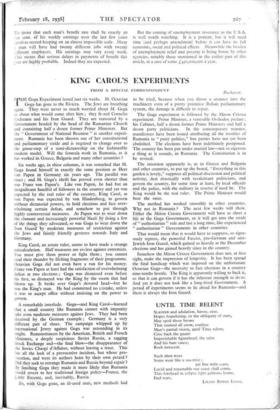THE DOLE IN THE U.S.A.
By RONALD C. DAVISON
NO one knows the exact measure of genuine unemployment in the United States, but official estimates indicate that, this winter, it is about twice as large as in Great Britain per head of population. That means not fewer than io,000,000 persons are out of work, excluding agriculture. They are a formidable army ! In this country they would all be eligible for the dole, either in the form of insurance benefit as a legal right or as unemployment assistance on a needs basis. Pay- ments at subsistence rates would be punctually made to them across the counters of our Employment Exchanges from the first week of unemployment. But for the American worker nothing like this systematic dole yet exists. There the workless man has to take his chance of assistance under one of three separate and unrelated schemes. His best hope would be to get on the list for Federal Work Relief, i.e., one of the nation-wide network of employment projects run by Mr. Harry Hopkins, the Works Progress Adminis- trator. There he would be better off than his English brother, for he would draw a weekly wage of 53s. to 90s. for months on end.
It is an astonishing business, this work-relief, covering no fewer than 2,000,000 unemployed, and making appropriate jobs for blackcoat workers and women as well as for labourers. There is even a dramatic section for actors and an art section for unemployed artists (quite good drama and quite good art !). The President's pet project, the Civilian Conserva- tion Corps, is another variation on the same theme. Since 1934, some two or three hundred thousand =employed young men have been maintained for six months' spells in work camps all over the States. Officers of the U.S. Army have managed the camps, and done it so sensibly that they have lived down the early suspicion of militarism. The cost of all these work schemes to the Government is, of course, crushing and prodigious ; indeed, some cuts have already been made, bringing down the number of jobs from three to two million since 1936, the peak year. All the same, this is still the most colossal experiment in relief works that the world has ever seen. Probably it represents the American people's last expiring kick against the repugnant notion of paying a man a dole for being idle.
But what about the rest of the io,000,000 unemployed ? The answer is that, some of them have been getting nothing at all, while others, if their need was desperate, have been dealt with on a poverty basis by the local Public Welfare Depart- ments—in our words, the Poor Law, but a very primitive Poor Law compared with our own. Indeed, social workers, who are a power in the land in the U.S.A., denounce the whole ramshackle business. They say that in many areas the local Public Welfare systems are inadequate, capricious and corrupt. In some counties in the South all relief has been in kind. The unemployed under 65 have had to be satisfied with surplus clothes made by the Works Progress Administration, and with food amounting to two sacks of dried skimmed milk and six grape fruit per month.
But there is still a third scheme now in operation, and it is one which will, in time, eclipse all the others. America is at last bringing herself into line with other modern indus- trial nations by adopting unemployment insurance. The principle was laid down in the Social Security Act of 1935. And now, after two years of preparation and one year of contributions, insurance benefits were due to bzgin in January in some 21 States of the Union. The other, States will follow later. Probably less than one-fifth of this winter's unemployed will qualify for the new benefit at first, but, none the less, the adventure into insurance is big with possible consequences, both political and social.
The American ‘vorker has never yet known what, it is to possess insurance rights like this, and he often has to have it explained to him that there is no test of means or needs attached to his new benefits. These will be 50 per cent. of average wages up to a maximum dole of L3 per week. Minimum benefits are usually 20s. and there is i strict time ratio between the number of benefit weeks and the period of contributory employment, with a maximum duration of 15 weeks' benefit. America believes in a long waiting period, varying from two to four weeks on each new claim. (In Britain today the waiting period is three days.) Except in one State, no dependants' allowances are paid. some of these provisions look very cautious and prudent to English eyes, especially the short duration of benefit. All the same the new schemes are going to be extraordinarily difficult to operate, especially as the administrative personnel is without any experience. There will be much confusion to begin with.
Compared with the centralised and fairly simple schemes of Britain and Germany, the American mosaic of 48 different insurance laws (and funds) suggests a positive nightmare. No arrangements have, so far, been made for reciprocal payment of benefits. Thus, either the mobility of labour will be gravely affected or thousands of insured claimants will lose their benefit rights every time they move across a State boundary. How long will they stand that ? It seems that in this, as in other modem problems, the tradition of State sovereignty is going to lose some of its charm. Obviously the Federal power will have to be invoked sooner or later, together with the convenience of a pooled fund. Already the Social Security Board in Washington exercises a mild unifying influence by paying 90 per cent, of the privet administrative expenses.
To the British observer the chief trouble about the American schemes is their peculiar elaboration. They are too ainbitioUs. To insist that each man's benefit rate shall be exactly 50 --er cent. Of his weekly earnings over the last few years Involves record-keeping on an almost impossible scale. Many a man will have had tvirenty different jobs with twenty iifferent employers. His earnings may vary every week. This means that serious delays in payments of benefit this ar are highly probable. Indeed they are expected. But the coming of unemployment insurance in the U.S.A. is well worth watching. It is a portent, but it will need time (and perhaps amendment) before it can have its full economic, social and political effects. Meanwhile the burden of unemployment relief and poverty is being borne by other agencies, notably those mentioned in the earlier part of this article, at a cost of some £450,000,000 a year.











































 Previous page
Previous page